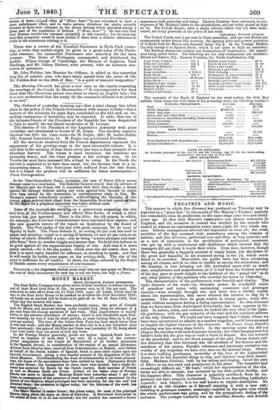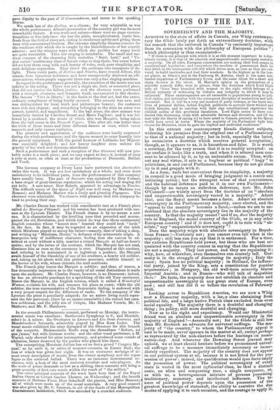THEATRES AND- MUSIC.
The manner in which Don Giovanni Ives produced on Thursday may be regarded as a "great fact " in the annals of Her Majesty's Theatre; scarcely less remarkable than its production on the same stage some two-and-thirty years ago. At that time Mozart's masterpiece was almost unknown in England, and the sensation it created was testified by the crowds who rushed to witness its representation every opera night for: two whole sea- sons. Inferior management allowed the impression to wear off; the weak novelties of the day .resumed their ascendancy among the votaries of fashion; and Don Giovanni, performed now and then, at long intervals and as a sort of concession to the predilection of antiquated amateurs, was got up with a carelessness and shabbiness which showed that the Managers did not think it worth their while. Even then, however, though there was generally a beggarly account of empty boxes, yet the lovers of the great and beautiful in art mustered strong in the pit, which never failed to be crowded. Meanwhile, the public taste has been advancing among all classes, and in no class so rapidly as among the aristocracy; and Mr. Lumley, in now bringing out this unrivalled opera with as much care, completeness, and magnificence, as if it 'had been the freshest novelty Of the day, gave as much delight to the habitues of the " grand tier" as to any other portion of the audience who crowded his house on 'I huraday. - The characteristics of the performance were breadth and vitality. The main features of the work—its dramatic power, its wonderful union Of grandeur and terror with enchanting sweetness and grotesque comedy—were strongly brought out; and there was a lifelike reality about the representation, that never allowed the interest to flag for a moment. This arose from its great wealth in strong parts; every cha- racter without exception having a fitting representative. No Don Giovanni that we have seen, from Ambrogetti downwards, has been superior to Co- letti. In person, mien, and costume, he looked the very ideal of the Span- ish gentleman, with the gay audacity of' the roué and the insidious address of the wily libertine. We could not have imagined that Coletti, whom we have been accustomed to admire as a sombre tragedian, could have assumed so happily the lighter features of the character. In Donna Anna, Parodi's colouring was less strong than Grisrs. In the opening scene she did not cling to the ravisher with such desperate tenacity; nor when hanging over her father's body did she give way to such a burst of despair. But she warmed as she proceeded; and in the finest passage of the part, Donna Anna's sud- den discovery that Don Giovanni was the assailant of her honour and the murderer of her parent, Parodrs vehement and passionate recitative was worthy of any tragedian we have ever seen on the musical stage. Octavio is a mere walking gentleman, unworthy of the love of the highminded Anna; but he has beautiful things to sing, and Gardoni sang them beauti- fully. Madame Giuliani, both by her acting and singing, raised the part of Elvira to its due rank and prominence in the piece. The beautiful and exceedingly difficult air, " Mi traell," which few representatives of the cha ratter are able to attempt, was executed by her with perfect facility, and the happiest effect. This character is generally sacrificed, from its im- portance not been properly understood. There is no describing Lablache's Leporello; and, happily, it is too well known to require description. He played it on this occasion as if himself enjoying it with a new zest; revelling in grotesque humour, seemingly inspired by the spirit with which the whole performance was going, and by the sympathetic feeling of the audience. The younger Labla,the was an excellent Masetto; and Arnold/
gave dignity to the part of II Commendatore, and terror to the speaking Statue.
We speak last of the Zerlina, as a climax; for very admirable as was the whole performance, Alboni's personation of the country girl was its most remarkable feature. It was truth and nature—there were no stage conven- tionalities or fine-ladyisms: she was the plain, unsophisticated, rustic lass, fresh from the field or vineyard, rioting in exuberant spirits and giving them vent with unrestrained freedom. Her extreme simplicity disarms censure for the readiness with which she is caught by the blandishments of her courtly admirer; and the winning ways with which she pacifies her angry lover are quite irresistible. Then her singing is inimitable. The small and me- dium compass of the charming little melodies, " Batti, batti," and " Ve- drai carino," enables any class of female voice to sing them; but never before did we hear them sung with such beauty of voice, such pure simplicity, and such delicious expression. They threw the audience into transports of de- light. These rustic parts, of Zerlina and Ninetta, have roused Alboni, this season, from luxurious indolence, and have unexpectedly disclosed an effi- cient actress, where people supposed there was only a fine singing-machine.
In regard to the performance generally, the execution of the music was not inferior to the acting. There was not a single air, duet, or concerted piece, that did not receive the fullest justice; and the choruses were performed with a strength, clearness, and dramatic truth, unexampled in this theatre. The famous " Viva la liberty," in the finale to the first act, had the extra- ordinary compliment of being loudly encored. The scenery was new, and was distinguished for local truth and picturesque beauty; the costumes were rich and elegant; and everything belonging to the mise en scene was correct, tasteful, and magnificent. In the ball scene, the slow minuet was beautifully danced by Caroline Rosati and Marie Taglioni; and it was fol- lowed by a saraband, the music of which also was Mozart's, being taken from the ball-scene in the Nozze di Figaro. This, after all, was better than the trick of three tunes and three different dances at once, which never succeeds and only causes confusion.
The pleasure and approbation of the audience were loudly expressed during the whole performance; and the Queen seemed to enter heartily into the general enjoyment. With the genial humour of Lablache her Majesty was especially delighted; and her hearty laughter even unbent the gravity of her staid and decorous attendants.
Such a performance and such a reception of Don Giovanni will now pro- bably make it a stock piece; and we may expect to have it, instead of once a year at most, as often at least as the productions of Donizetti, Bellini, and Verdi.



























 Previous page
Previous page